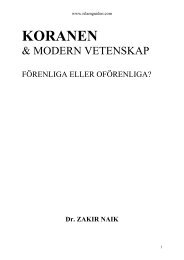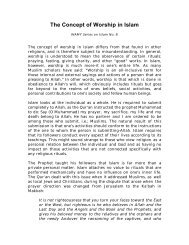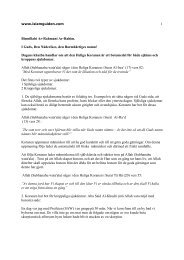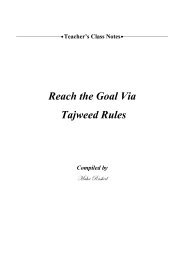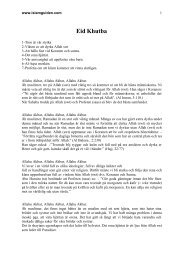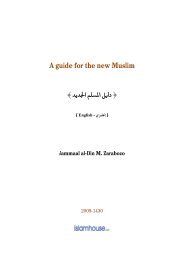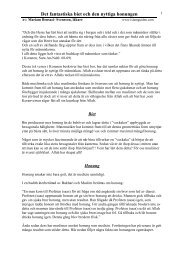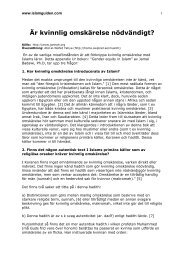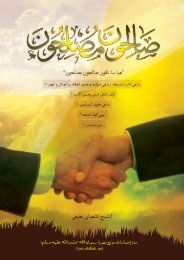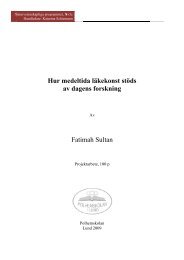The Prophet's Prayer From The beginning To The End As Though ...
The Prophet's Prayer From The beginning To The End As Though ...
The Prophet's Prayer From The beginning To The End As Though ...
You also want an ePaper? Increase the reach of your titles
YUMPU automatically turns print PDFs into web optimized ePapers that Google loves.
"He would not rest his fore-arms on the ground" 106 , but "would raise them above the ground, and keep them away from his sides<br />
such that the whiteness of his armpits could be seen from behind" 107 , and also "such that if a small lamb or kid wanted to pass<br />
under his arms, it would have been able to do so." 108<br />
He would do this to such an extent that one of his Companions said, "We used to feel sorry for the Messenger of Allaah (sallallaahu<br />
'alaihi wa sallam) because of the way he kept his hands away from his sides." 109<br />
He used to order likewise, saying, When you perform sajdah, place your palms (on the ground) and raise your elbows 110 , and Be<br />
level in sujood, and none of you should spread his fore- arms like the spreading of a dog (in one narration: like a dog spreads<br />
them) 111 . In a separate hadeeth, None of you should rest arms on the ground the way a dog rests them. 112<br />
He also used to say, Do not spread your arms [the way a beast of prey does], rest on your palms and keep your upper arms apart,<br />
for when you do all that, every one of your limbs prostrates with you. 113<br />
<strong>The</strong> Obligation to be at Ease in Sujood<br />
He (sallallaahu 'alaihi wa sallam) used to command the completion of rukoo' and sujood, comparing someone not doing so to the<br />
hungry man who eats one or two dates, which are of no use to him, and also saying about him, he is indeed one of the worst<br />
thieves among the people.<br />
He also ruled that the prayer of one who does not straighten his spine fully in rukoo' and sujood is invalid, as has been mentioned<br />
under "Rukoo'", and ordered "the one who prayed badly" to be at ease in his sujood, as mentioned before.<br />
<strong>The</strong> Adhkaar of Sujood<br />
He (sallallaahu 'alaihi wa sallam) would say any one of the following remembrances of Allaah and supplications in this posture:<br />
1.<br />
2.<br />
How Perfect is my Lord, the Most High, three times. 114<br />
Sometimes, "he would repeat it more times than that." 115<br />
Once, he repeated it so much that his sujood were nearly as long as his standing, in which he had recited three of the Long<br />
Soorahs: al-Baqarah, an-Nisaa' and aal-'Imraan. That prayer was full of supplication and seeking of forgiveness, as<br />
mentioned before under "Night <strong>Prayer</strong>".<br />
3.<br />
How Perfect is my Lord, the Most High, and Praised be He, three times. 116<br />
4.<br />
Perfect, Blessed, Lord of the Angels and the Spirit. 117<br />
5.<br />
How perfect You are O Allaah, our Lord, and Praised. O Allaah! Forgive me, which he would say often in his rukoo' and<br />
sujood, implementing the order of the Qur'aan. 118<br />
O Allaah! For you I have prostrated; in You I have believed; to You I have submitted; [You are my Lord;] my face has<br />
prostrated for the One Who created it and shaped it , [shaped it excellently,] then brought forth its hearing and vision: [so]<br />
blessed be Allaah, the Best to Create! 119<br />
٤٦



